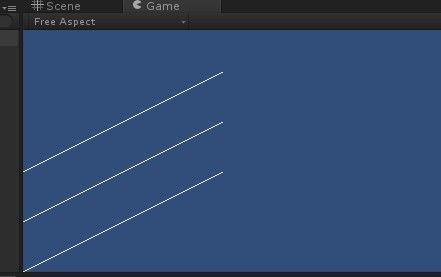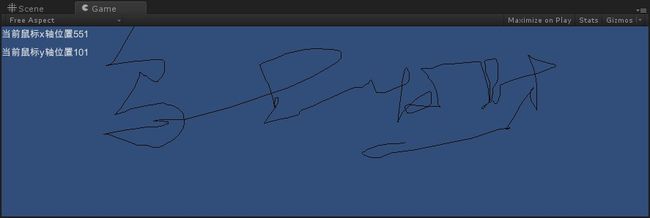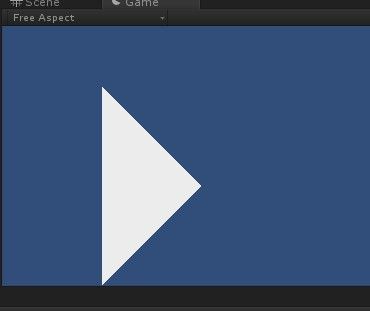GL
http://blog.csdn.net/coffeecato/article/details/52671032
1、绘制2D图像的时需要使用GL.LoadOrtho()方法来将图形映射到平面中。
2、所有绘制相关的内容都要写在OnPostRender()方法中。
3、有关GL图像库的脚本需要绑定到Hierarchy视图中Camera上,否则无法显示绘制的图像。
4、在GL图像库的平面坐标系中,每个点的横坐标和纵坐标都应当是0与1之间的浮点数,而真实的像素坐标需要根据这个浮点数来计算
一、绘制线
别忘了添加物理材质public Material material;
using
UnityEngine;
using
System.Collections;
///
///
GL 图像库
///
1、GL图像库是底层的图像库,主要功能是使用程序来绘制常见的2D与3D几何图形。这些图形
///
具有一定的特殊性,它们不属于3D网格图形,只会以面的形式渲染
///
///
2、绘制2D图像时,需要使用GL.LoadOrtho()方法来将图形映射在平面中,绘制的是3D图形,就无须使用此方法
///
///
3、使用GL图像库时,需要将所有绘制相关的内容写在OnPostRender()方法中
///
public
class
_7_5 : MonoBehaviour
{///
///
绘制线段的材质
///
public
Material material;
private
void
OnPostRender()
{if
(!
material)
{
Debug.Log("
请给材质资源赋值
"
);
return
;
}
material.SetPass(0
);
//
设置该材质通道,0为默认值
GL.LoadOrtho();//
设置绘制2D图像
GL.Begin(GL.LINES);//
表示开始绘制,绘制类型为线段
DrawLine(0
,
0
,
200
,
100
);
//
绘制线段0
DrawLine(0
,
50
,
200
,
150
);
//
绘制线段1
DrawLine(0
,
100
,
200
,
200
);
//
绘制线段2
GL.End();//
结束绘制
}
private
void
DrawLine(
float
x1,
float
y1,
float
x2,
float
y2)
{//
绘制线段,需要将屏幕中某个点的像素坐标除以屏幕宽或高
GL.Vertex(new
Vector3(x1 / Screen.width, y1 / Screen.height,
0
));
//
['vɜ:teks] n. 最高点;顶点;<数>(三角形、圆锥体等与底相对的)顶;
GL.Vertex(new
Vector3(x2 / Screen.width, y2 / Screen.height,
0
));
}//
Use this for initialization
void
Start()
{}//
Update is called once per frame
void
Update()
{}}
二、绘制曲线
using
UnityEngine;
using
System.Collections;
using
System.Collections.Generic;
///
///
绘制曲线
///
public
class
_7_5_1 : MonoBehaviour
{///
///
绘制线段材质
///
public
Material material;
private
List
lineInfo;
//
Use this for initialization
void
Start()
{//
初始化鼠标线段链表
lineInfo =new
List
();
}//
Update is called once per frame
void
Update()
{//
将每次鼠标改变的位置存储进链表
lineInfo.Add(Input.mousePosition);
}private
void
OnGUI()
{
GUILayout.Label("
当前鼠标x轴位置
"
Input.mousePosition.x);
GUILayout.Label(
"
当前鼠标y轴位置
"
Input.mousePosition.y);
}
private
void
OnPostRender()
{
if
(!
material)
{
Debug.LogError(
"
请给材质资源赋值
"
);
return
;
}
material.SetPass(
0
);
//
设置该材质通道,0为默认值
GL.LoadOrtho();
//
设置绘制2D图像
GL.Begin(GL.LINES);
//
表示开始绘制,绘制类型为线段
for
(
int
i =
0
; i < lineInfo.Count -
1
; i++
)
{
Vector3 start
=
lineInfo[i];
Vector3 end
= lineInfo[i +
1
];
//
绘制线段
DrawLine(start.x, start.y, end.x, end.y);
}
GL.End();
}
///
///
绘制线段
///
///
///
///
///
private
void
DrawLine(
float
x1,
float
y1,
float
x2,
float
y2)
{
//
绘制线段,需要将屏幕中某个点的像素坐标点除以屏幕宽或高
GL.Vertex(
new
Vector3(x1 / Screen.width, y1 / Screen.height,
0
));
//
[ˈvɜ:ˌteks] 最高点;顶点
GL.Vertex(
new
Vector3(x2 / Screen.width, y2 / Screen.height,
0
));
}
}
三、绘制四边形
绘制四边形,需要使用GL.Begin(GL.QUADS)方法
using
UnityEngine;
using
System.Collections;
public
class
_7_5_3 : MonoBehaviour
{///
///
可用材质0
///
public
Material material0;
///
///
可用材质1
///
public
Material material1;
///
///
可用材质2
///
public
Material material2;
private
void
OnPostRender()
{//
绘制正四边形
DrawRect(100
,
100
,
100
,
100
, material0);
DrawRect(250
,
100
,
100
,
100
, material1);
//
绘制无规则四边形
DrawQuads(15
,
5
,
10
,
115
,
95
,
110
,
90
,
10
, material2);
}///
///
绘制正四边形
///
///
x轴起始坐标
///
y轴起始坐标
///
正四边形的宽
///
正四边形的高
///
private
void
DrawRect(
float
x,
float
y,
float
width,
float
height, Material material)
{
GL.PushMatrix();//
[ˈmeɪtrɪks]n. <数>矩阵;模型;基质;母体,子宫
material.SetPass(0
);
GL.LoadOrtho();
GL.Begin(GL.QUADS);//
绘制类型为四边形
GL.Vertex3(x / Screen.width, y / Screen.height,0
);
//
['vɜ:teks] n. 最高点;顶点
GL.Vertex3(x / Screen.width, (y + height) / Screen.height,0
);
GL.Vertex3((x
- width) / Screen.width, (y + height) / Screen.height,
0
);
GL.Vertex3((x
- width) / Screen.width, y / Screen.height,
0
);
GL.End();
GL.PopMatrix();
}
///
///
绘制无规则的四边形
///
///
起始点1的横坐标
///
起始点1的纵坐标
///
起始点2的横坐标
///
起始点2的纵坐标
///
起始点3的横坐标
///
起始点3的纵坐标
///
起始点4的横坐标
///
起始点4的纵坐标
///
material
private
void
DrawQuads(
float
x1,
float
y1,
float
x2,
float
y2,
float
x3,
float
y3,
float
x4,
float
y4, Material material)
{
GL.PushMatrix();
material.SetPass(
0
);
GL.LoadOrtho();
GL.Begin(GL.QUADS);
//
绘制类型为四边形
GL.Vertex3(x1 / Screen.width, y1 / Screen.height,
0
);
GL.Vertex3(x2
/ Screen.width, y2 / Screen.height,
0
);
GL.Vertex3(x3
/ Screen.width, y3 / Screen.height,
0
);
GL.Vertex3(x4
/ Screen.width, y4 / Screen.height,
0
);
GL.End();
GL.PopMatrix();
}
//
Use this for initialization
void
Start()
{
}
//
Update is called once per frame
void
Update()
{
}
}
四、绘制三角形
使用GL.Begin(GL.TRIANGLE)方法,
参数为三角形的类型
。
['traɪæŋɡl]n.
using
UnityEngine;
using
System.Collections;
///
///
绘制三角形
///
使用GL.Vertex3()方法确定三角形三个顶点的位置,并将绘制三角形
///
的所有方法封装在DrawTriangle()方法中,最后使用GL.End()方法将三角形显示在屏幕中。
///
需要说明的是,在调用DrawTriangle()方法时,需要将三个点的坐标与材质传入该方法。
///
public
class
_7_5_4 : MonoBehaviour
{///
///
材质
///
public
Material material;
private
void
OnPostRender()
{//
绘制三角形
DrawTriangle(100
,
0
,
100
,
200
,
200
,
100
, material);
}///
///
绘制三角形
///
Triangle n. 三角形;三人一组['traɪæŋɡl]
///
private
void
DrawTriangle(
float
x1,
float
y1,
float
x2,
float
y2,
float
x3,
float
y3, Material material)
{
material.SetPass(0
);
GL.LoadOrtho();
GL.Begin(GL.TRIANGLES);//
绘制三角形
GL.Vertex3(x1 / Screen.width, y1 / Screen.height,0
);
GL.Vertex3(x2/ Screen.width, y2 / Screen.height,
0
);
GL.Vertex3(x3/ Screen.width, y3 / Screen.height,
0
);
GL.End();
}//
Use this for initialization
void
Start()
{}//
Update is called once per frame
void
Update()
{}}
五、绘制3D几何图形
using
UnityEngine;
using
System.Collections;
///
///
绘制 3D几何图形
///
public
class
_7_5_5 : MonoBehaviour
{region
材质
public
Material material0;
public
Material material1;
public
Material material2;
endregion
private
void
OnPostRender()
{//
绘制正四边形
DrawRect(100
,
100
,
100
,
100
, material0);
DrawRect(250
,
100
,
100
,
100
, material1);
//
绘制无规则四边形
DrawQuads(15
,
5
,
10
,
115
,
95
,
110
,
90
,
10
, material2);
}///
///
绘制正四边形
///
///
x轴起始坐标
///
y轴起始坐标
///
正四边形的宽
///
正四边形的高
///
material
private
void
DrawRect(
float
x,
float
y,
float
width,
float
height, Material material)
{
GL.PushMatrix();
material.SetPass(0
);
GL.Begin(GL.QUADS);//
四边形
GL.Vertex3(x / Screen.width, y / Screen.height,0
);
GL.Vertex3(x/ Screen.width, (y + height) / Screen.height,
0
);
GL.Vertex3((x
- width) / Screen.width, (y + height) / Screen.height,
0
);
GL.Vertex3(x
/ Screen.width, (y + height) / Screen.height,
0
);
GL.End();
GL.PopMatrix();
}
///
///
绘制无规则四边形
///
///
起始点1的横坐标
///
起始点1的纵坐标
///
起始点2的横坐标
///
起始点2的纵坐标
///
起始点3的横坐标
///
起始点3的纵坐标
///
起始点4的横坐标
///
起始点4的纵坐标
///
material
private
void
DrawQuads(
float
x1,
float
y1,
float
x2,
float
y2,
float
x3,
float
y3,
float
x4,
float
y4,
Material material)
{
GL.PushMatrix();
//
[ˈmeɪtrɪks] n. <数>矩阵;模型;基质;母体,子宫
material.SetPass(
0
);
GL.Begin(GL.QUADS);
GL.Vertex3(x1
/ Screen.width, y1 / Screen.height,
0
);
GL.Vertex3(x2
/ Screen.width, y2 / Screen.height,
0
);
GL.Vertex3(x3
/ Screen.width, y3 / Screen.height,
0
);
GL.Vertex3(x4
/ Screen.width, y4 / Screen.height,
0
);
GL.End();
GL.PopMatrix();
}
//
Use this for initialization
void
Start()
{
}
//
Update is called once per frame
void
Update()
{
}
}
六、绘制线
任何一个模型都由若干网格面组成,而每一个面又由若干个三角形组成,也就是说,模型是由若干个三角形面组成的
using
UnityEngine;
using
System.Collections;
public
class
_7_5_7 : MonoBehaviour
{region
构成三角形1的三个顶点位置
Vector3 v0
=
new
Vector3(
5
,
0
,
0
);
Vector3 v1=
new
Vector3(
0
,
5
,
0
);
Vector3 v2=
new
Vector3(
0
,
0
,
5
);
endregion
//
构成三角形2的三个顶点位置
Vector3 v3 =new
Vector3(-
5
,
0
,
0
);
Vector3 v4=
new
Vector3(
0
, -
5
,
0
);
Vector3 v5=
new
Vector3(
0
,
0
, -
5
);
//
构成三角形1的贴图比例
Vector2 u0 =new
Vector2(
0
,
0
);
Vector2 u1=
new
Vector2(
0
,
5
);
Vector2 u2=
new
Vector2(
5
,
5
);
//
构成三角形2的贴图比例
Vector2 u3 =new
Vector2(
0
,
0
);
Vector2 u4=
new
Vector2(
0
,
1
);
Vector2 u5=
new
Vector2(
1
,
1
);
//
Use this for initialization
void
Start()
{//
得到网格渲染器对象
MeshFilter meshFilter = (MeshFilter)GameObject.Find("
face
"
).GetComponent(
typeof
(MeshFilter));
Mesh mesh= meshFilter.mesh;
//
通过渲染器对象得到网格对象
mesh.vertices =new
Vector3[] { v0, v1, v2, v3, v4, v5 };
//
n. 至高点,头顶;最高点( vertex的名词复数 );[ˈvə:tisi:z]
mesh.uv =new
Vector2[] { v0, v1, v2, v3, v4, v5 };
//
设置三角形面上的贴图比例
mesh.triangles =new
int
[] {
0
,
1
,
2
,
3
,
4
,
5
};
//
[t'raɪæŋɡlz] n. 三角形( triangle的名词复数 );
}
//
Update is called once per frame
void
Update()
{}}



